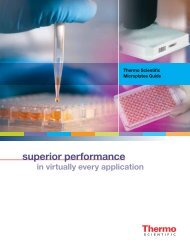PeloBiotech
You also want an ePaper? Increase the reach of your titles
YUMPU automatically turns print PDFs into web optimized ePapers that Google loves.
www.pelobiotech.com<br />
Furthermore, the establishment of living biobanks comprising patient-derived xenografts, primary tumor tissue, normal<br />
tissue, sera, and cancer cell lines has facilitated the study of tumor characteristics and mechanisms of atherosclerosis. The<br />
expression of PDX-1, a key regulator of beta cell maturation and differentiation, has been investigated in pancreatic<br />
cancer, shedding light on its significance in the disease. Moreover, the potential of stem cells in the treatment of skeletal<br />
muscle injury and disease has been explored, highlighting the therapeutic implications of multipotent stem cells derived<br />
from adult bone marrow, fat, skin, periosteum, and muscle. These studies collectively demonstrate the wide-ranging<br />
applications of these cell types in advancing our understanding of various diseases and in the development of novel<br />
therapeutic strategies.<br />
Kidney<br />
We offer a range of fibroblasts, endothelial cells, epithelial<br />
cells, mesangial cells, and podocytes from various regions of<br />
the kidney, sourced from different species. Fibroblasts play a<br />
crucial role in renal fibrosis, and their origin in renal fibrosis has<br />
been a subject of controversy, highlighting the importance of<br />
understanding their role in kidney pathology. Endothelial cells<br />
have been studied for their involvement in angiogenesis and<br />
their response to various factors in the context of kidney<br />
diseases, providing insights into their role in kidney function and<br />
pathology. Epithelial cells have been investigated for their<br />
protective role against oxidative cell injury, shedding light on<br />
their significance in acute kidney injury and chronic kidney<br />
diseases.<br />
Mesangial cells have been shown to participate in immune function in the kidney and have been studied for their role in<br />
maintaining the structure and function of the glomerulus and in the pathogenesis of glomerular diseases. Podocytes have<br />
been studied for their involvement in renal fibrosis and their response to growth factors, providing insights into their role<br />
in kidney fibrosis and compensatory hypertrophy. The study of bone marrow-derived cells carrying a polycystic kidney<br />
disease mutation in the genetically normal kidney has provided valuable insights into the fate of these cells in the kidney,<br />
particularly following renal injury, contributing to our understanding of kidney regeneration and disease progression.<br />
Additionally, the expression of a novel mesangium-predominant gene, Megsin, in the renal tissues of various glomerular<br />
diseases has been investigated, shedding light on its potential role in the pathogenesis of kidney diseases. Moreover, the<br />
use of laser ablation of the zebrafish pronephros to study renal epithelial regeneration has provided a novel tool for the<br />
study of epithelial injury in zebrafish, offering insights into kidney regeneration and repair. These studies collectively<br />
contribute to a comprehensive understanding of kidney biology and pathology, providing a basis for the development of<br />
novel therapeutic strategies for kidney diseases.<br />
Intestine<br />
Smooth muscle cells have been investigated for their<br />
involvement in intestinal motility, peristalsis, and the<br />
pathogenesis of intestinal fibrosis. Studies have shown that<br />
smooth muscle cells play a crucial role in the regulation of<br />
intestinal motility and peristalsis, and their phenotypic<br />
plasticity has been implicated in mechanical obstruction of the<br />
small intestine. Smooth muscle cells have been used in tissue<br />
engineering for intestinal reconstruction, exhibiting<br />
spontaneous rhythmic contraction in vitro and showing<br />
potential for functional smooth muscle bioengineering.<br />
Fibroblasts have been studied for their involvement in<br />
intestinal fibrosis, inflammation, and the regulation of<br />
intestinal epithelial cells. Studies have shown that fibroblasts<br />
play a role in the pathogenesis of intestinal strictures in Crohn's<br />
disease and have been implicated in the secretion of inflammatory mediators from LPS-induced rat intestinal microvascular<br />
endothelial cells. Additionally, fibroblasts have been shown to modulate colonocytes in co-culture and contribute to the<br />
development of intestinal fibrosis. Endothelial cells have been extensively studied for their involvement in intestinal<br />
microvascular development, angiogenesis, and the regulation of intestinal fibrosis. Studies have shown that endothelial<br />
cells express Toll-like receptor 5 and are involved in the secretion of inflammatory mediators from LPS-induced rat<br />
intestinal microvascular endothelial cells.<br />
16
















